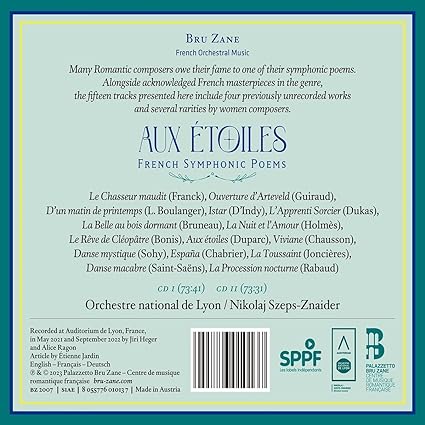A lot of this music was unknown to me, including at least four premier recordings. Not everything is a masterpiece, of course. There are a lot of long, rather drawn-out tone-poems here – all of it colorful and Impressionistic in a typical French way, but also a surprising amount of it bears a strong influence of Richard Strauss, and even a bit of Wagner.
In general, I found Disc 2 the better of the two as to musical interest and recording quality. Only one track on Disc 1 really stood out from the rest, Lili Boulanger’s “On a Spring Morning” (D’un matin de printemps). And how glorious it is – 6 ½ minutes of pure inspiration and creative mastery, superbly orchestrated. Regrettably, it’s one of the shortest works in the entire collection.
Disc 2’s highlights include Duparc’s “To the Stars” (Aux etoiles), Chausson’s Viviane, and Sohy’s Danse mystique. All of it captivating and musically enlightening. The opening few minutes of Rabaud’s “Nocturnal Procession” is also very nice, with its sumptuous strings and a gorgeous oboe solo. But, alas, it soon turns impossibly Wagnerian in scope and weight, going on for 15 long minutes before finally bringing the concert to a grandiose close. (And this piece isn’t the only one on the program like that.)
As to the familiar favorites, those which will likely be a primary draw for many (myself included), they are a mixed bag. Unfortunately, Disc 1 is occasionally plagued with recording problems. A lower transfer level and a laid-back orchestral balance and perspective result in some low-voltage, low-energy readings. Sadly, the worst affected are “The Accursed Huntsman” (Le Chasseur maudit) by Franck and The Sorcerer’s Apprentice (Dukas). Which is a pity. The Franck in particular is a fine reading, with good momentum and drive. But as recorded, the brass and percussion are so recessed way back in the hall, drama and dynamic power are restrained, somewhat diminishing the orchestra’s ability to make a real impact when called for. As to the Dukas, it’s unexceptional to begin with, and with the low-voltage recording, the musical characterization falls flat.
On the other hand, Disc 2 gives us a lively Espana (Chabrier) with markedly improved sound which provides more presence and immediacy to the orchestra, thus enhancing musical involvement. And there’s a decent (though ultimately routine) Danse Macabre (Saint-Saens).
The recording quality is a real factor in this set. This program was recorded in two sets of sessions, separated by 16 months, and the differences between them can easily be heard. However, except in those selections where extrovert drama and dynamic impact are of utmost importance, the orchestra is colorful and warm, blanketed in a cozy, cushioned reverberation, with an emphasis on the strings. And the playing throughout is very fine – especially considering they are likely sight-reading much of this.
In the end, this is a wonderful collection of mostly unfamiliar French music, musically pleasing and richly orchestrated. However, taken as a whole, it is certainly too much to absorb in just one or two listening sessions. I found myself losing interest and wandering into another room as it played on, before hearing something which grabbed my attention and drew me back to the stereo.
I approached this set again a week later, this time listening in smaller chunks spread across several days, and began to fully appreciate its many rewards. However, there remained a pervading sense of “sameness” to much of this music. The relaxed, plush recording doesn’t help in this regard. I do wish the orchestra was afforded a bit more life and sparkle. And it is most unfortunate the balance engineer miscalculated the microphone placement on the most familiar and enticing pieces (Dukas, Franck). This for me seriously diminishes the appeal of an otherwise intriguing collection.
Overall, the production itself is impressive. It is presented in an attractive 3-way foldout cardboard enclosure which contains the two CDs and an enormous (100-pages!) bound paper-back book – replete with copious program notes in multiple languages, historical photos, an itemized listing of orchestral personnel, and recording details. It’s almost too much, truth be told, being rather cumbersome to find what you’re looking for. (And annoyingly, the track listing does not appear on the first pages; you have to flip through a few to get to it.) Nonetheless, it is an impressive publication for a CD booklet, lending a luxurious feel to the entire package. And musically, there is much to enjoy.










